I am not an expert on this breed, I'm merely a long time enthusiast.
So I'll write a thing or two about my experience with this breed for people interested in the Caucasian Ovcharka (Russian for shepherd dog).
A well written breed standard can be found here: or here:
Short history of the breed & their use as LGD's in the modern era:
The Caucasian shepherd dogs as a breed have a very long history.
Originally they were a landrace livestock guardian breed from the Caucasus Mountains, where they have been used to guard livestock from large predators for probably 2-3000 years.
The evolution of the breed was not only a result of natural selection but it was also influenced by nations that inhabited the Caucasian Region.
Which basically means that the breed would slightly vary from one country in the Caucasian Region to another.
Around 1920 the Soviets started selecting them for military purposes as guard dogs.
The Soviet military decided that this breed would make the perfect guardians for their military purposes.
So they imported them from Georgia, Armenia, Dagestan etc (back then they were all apart of the Soviet Union) and started selecting them for their guarding abilities.
In the then East Germany, 7000 Caucasian shepherds were at one point used to guard the Berlin Wall.
And even though the Caucasian shepherd dogs were no longer a landrace breed, but instead man-made, the breed non the less kept its phenotypic diversity.
After the fall of the Soviet Union, the Caucasian shepherd dogs remained to be used for guarding of prisons, factories, properties, homes etc but they also became more popular with the dog fanciers.
Which brings me to another point: most modern Caucasian shepherds (meaning they are no longer those aboriginal dogs straight from Caucasus) are used as property guardians nowadays and no longer as LGD's.
Non the less, this breed can still make an excellent livestock guardian, as long as the future owner keeps a few things in mind.
Here in U.S. there is a Russian Caucasian shepherd breeder that raises her dogs with a flock of sheep and they are doing really well.
And I know several other people that have been using them successfully as LGD's. Ours are amazing with horses.
They are very, very protective and a well bred Caucasian shepherd will not allow anything or anyone near whatever they are supposed to guard.
That said, I did notice (and I've heard the same thing from couple of breeders) that this breed bonds firstly and fore mostly to their humans and their territory.
In general the modern Caucasian shepherds don't do great if they say for instance have to guard a flock on an isolated pasture, with limited human interaction.
They seem to do much, much better if they are on a farm guarding animals where they also get to see their humans on a daily basis. Even though they do have the typical LGD aloof and independent temperament.
So in that aspect they are very much like the Tibetan Mastiffs.
And in general they do have a somewhat higher prey drive when compared to most other LGD breeds.
On one hand that does means that it makes it even more difficult to teach them not to chase poultry and rabbits, but on the other hand it also means they make excellent vermin control.
Garter snakes, mice, rats, possums etc will not be allowed on their property.
A Caucasian shepherd needs experienced owners. They should only be owned by knowledgeable people that have a lot of space and are looking for a great property/livestock guardian.
Well fenced property is a must for this breed, I can not stress that one enough.
A well bred Caucasian shepherd is very agile and active. Which is why a minimum of 6ft fence is so important.
They are one of the most protective breeds (with other words: you don't have to train them to protect their property from strangers) out there.
Typically when a well bred Caucasian shepherd sees strangers or other canines near their property, there is just no stopping these dogs.
And that is why this breed needs to be socialized properly from early on, so they can differentiate between real threats and something that is simply new or unusual.
Outside of their property well bred CO's are very aloof with strangers.
Health concerns:
I will only write about the most common health issues in this breed.
Although overall a healthy breed, the Caucasian shepherd breed can get several health problems: Hip/Elbow Dysplasia, Hypothyroidism, Heart diseases, Skin issues, Ectropion & Entropion, Bloating etc.
To any potential buyers I will say this: this breed is quite expensive, avoid breeders who breed mainly for looks (unfortunately there are way too many Caucasian shepherd breeders out there who desire massive dogs, which leads to even more health problems).
Avoid breeders that are purposely breeding giant CO's. This breed is not supposed to be giant even though there is no maximum height or weight in their breed standard.
A lot of breeders strive for males to be between 29 and 32 inches tall at withers and for females 27-28 inches.
Their weight should be in proportion to the height, giving a balanced, imposing appearance. This breed is supposed to be agile and long living.
Look for breeders whose main goal is to breed stable, healthy dogs as according to the standard. Ask them if & how they test their dogs.
And ask them to show you the health results of their dogs! This one is very important.
A note on temperament testing:
Ethical Caucasian shepherd breeders will test the character of their breeding stock (through a test as approved by Russian Kynological Federation)
They will only breed with stable, protective individuals.
Avoid breeders that don't do that and avoid breeders that claim Caucasian shepherds should be trained to protect.
What to expect from your Caucasian shepherd puppy & should I get a male or a female question:
Let's say you have done your homework and found an ethical breeder.
And now you are wondering if you should get a male or a female..
Naturally a good breeder will be able to help you with that decision, and for first time CO owners, I say always get the opposite gender of your current dog (if you have one).
There will be a much bigger chance that the two of them will get along.
Other than a difference in size, females tend to bark more and are usually the more dominant one in multi-dog household.
As the puppy is growing, a female will often remain longer friendly towards strangers than a male. But a well bred CO should guard equally, regardless of their gender.
Both males and females can often be quite dog aggressive towards strange dogs.
Your CO puppy will require adequate socialization from early on, so it can develop into a mature dog with a good judgment.
And your CO puppy will challenge you several times as it's growing.
Like all LGD breeds they are stubborn and independent. Some CO's will try and push their boundary more than others.
But they are trainable.
The more firm you are as an owner, the less they will challenge you. And if you raised them right, at around 18 months they will settle down.
You have to be a firm, stable, consistent owner to avoid any issues with your CO. And you need to work on creating a bond of trust and love with your CO.
They are very, very affectionate dogs with their own people. And normally they are good with their own children, but young dogs can be quite clumsy and accidentally run them over.
With the children they don't know, always use caution. And never, ever live them alone with small kids. But the last can be said about all dogs.
Several random CO pictures to demonstrate the great variation within this breed (I wrote the name of the dogs right in front of the picture):
Atlant:
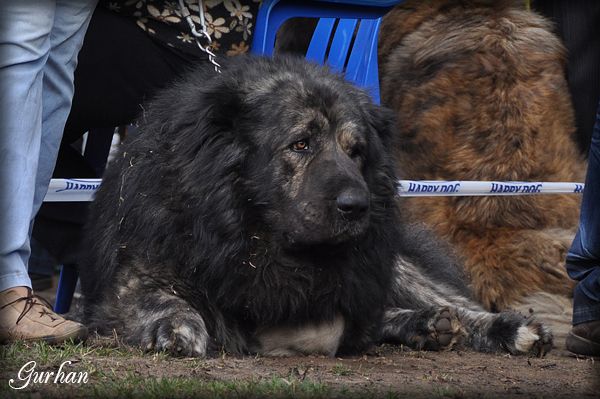
Sanroz Lajers Zhanybek:
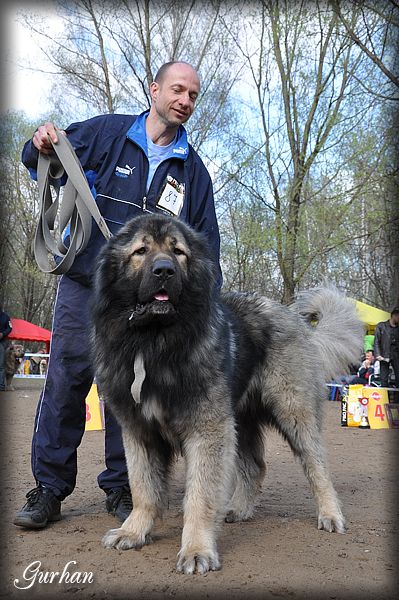
Charujushaja Noc
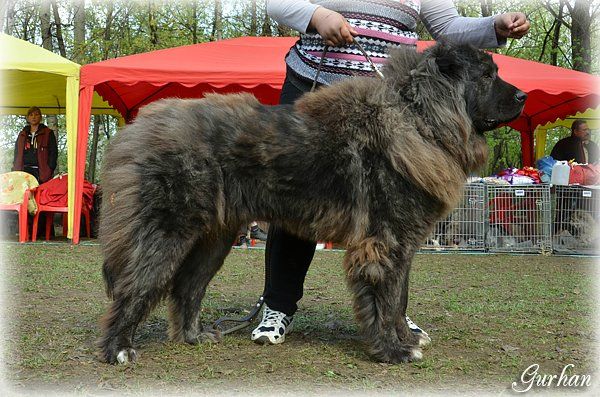
Glavar iz Russkogo Riska

Sherpskij Vlastelin
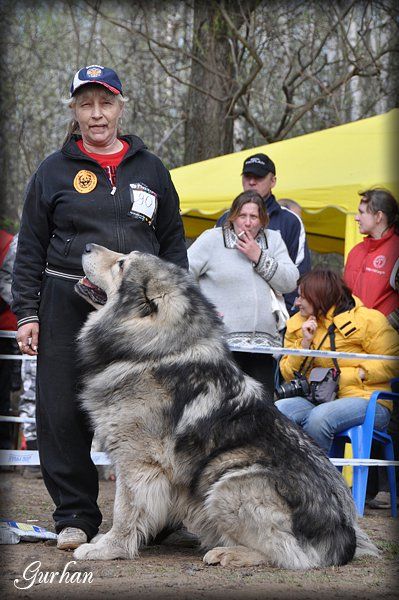
Russkiy Risk ALMAZ
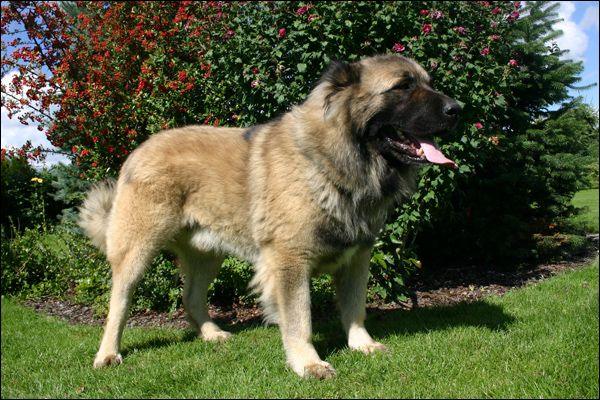
Dzherom

Zagorskie Dali Edmon
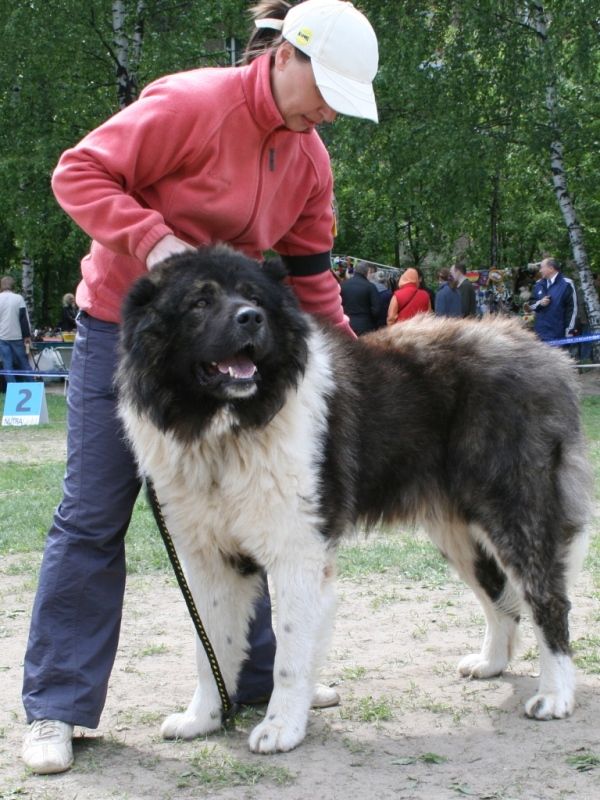
Hranitel gor Leshiy

Hranitel gor Dato

So I'll write a thing or two about my experience with this breed for people interested in the Caucasian Ovcharka (Russian for shepherd dog).
A well written breed standard can be found here: or here:
Short history of the breed & their use as LGD's in the modern era:
The Caucasian shepherd dogs as a breed have a very long history.
Originally they were a landrace livestock guardian breed from the Caucasus Mountains, where they have been used to guard livestock from large predators for probably 2-3000 years.
The evolution of the breed was not only a result of natural selection but it was also influenced by nations that inhabited the Caucasian Region.
Which basically means that the breed would slightly vary from one country in the Caucasian Region to another.
Around 1920 the Soviets started selecting them for military purposes as guard dogs.
The Soviet military decided that this breed would make the perfect guardians for their military purposes.
So they imported them from Georgia, Armenia, Dagestan etc (back then they were all apart of the Soviet Union) and started selecting them for their guarding abilities.
In the then East Germany, 7000 Caucasian shepherds were at one point used to guard the Berlin Wall.
And even though the Caucasian shepherd dogs were no longer a landrace breed, but instead man-made, the breed non the less kept its phenotypic diversity.
After the fall of the Soviet Union, the Caucasian shepherd dogs remained to be used for guarding of prisons, factories, properties, homes etc but they also became more popular with the dog fanciers.
Which brings me to another point: most modern Caucasian shepherds (meaning they are no longer those aboriginal dogs straight from Caucasus) are used as property guardians nowadays and no longer as LGD's.
Non the less, this breed can still make an excellent livestock guardian, as long as the future owner keeps a few things in mind.
Here in U.S. there is a Russian Caucasian shepherd breeder that raises her dogs with a flock of sheep and they are doing really well.
And I know several other people that have been using them successfully as LGD's. Ours are amazing with horses.
They are very, very protective and a well bred Caucasian shepherd will not allow anything or anyone near whatever they are supposed to guard.
That said, I did notice (and I've heard the same thing from couple of breeders) that this breed bonds firstly and fore mostly to their humans and their territory.
In general the modern Caucasian shepherds don't do great if they say for instance have to guard a flock on an isolated pasture, with limited human interaction.
They seem to do much, much better if they are on a farm guarding animals where they also get to see their humans on a daily basis. Even though they do have the typical LGD aloof and independent temperament.
So in that aspect they are very much like the Tibetan Mastiffs.
And in general they do have a somewhat higher prey drive when compared to most other LGD breeds.
On one hand that does means that it makes it even more difficult to teach them not to chase poultry and rabbits, but on the other hand it also means they make excellent vermin control.
Garter snakes, mice, rats, possums etc will not be allowed on their property.
A Caucasian shepherd needs experienced owners. They should only be owned by knowledgeable people that have a lot of space and are looking for a great property/livestock guardian.
Well fenced property is a must for this breed, I can not stress that one enough.
A well bred Caucasian shepherd is very agile and active. Which is why a minimum of 6ft fence is so important.
They are one of the most protective breeds (with other words: you don't have to train them to protect their property from strangers) out there.
Typically when a well bred Caucasian shepherd sees strangers or other canines near their property, there is just no stopping these dogs.
And that is why this breed needs to be socialized properly from early on, so they can differentiate between real threats and something that is simply new or unusual.
Outside of their property well bred CO's are very aloof with strangers.
Health concerns:
I will only write about the most common health issues in this breed.
Although overall a healthy breed, the Caucasian shepherd breed can get several health problems: Hip/Elbow Dysplasia, Hypothyroidism, Heart diseases, Skin issues, Ectropion & Entropion, Bloating etc.
To any potential buyers I will say this: this breed is quite expensive, avoid breeders who breed mainly for looks (unfortunately there are way too many Caucasian shepherd breeders out there who desire massive dogs, which leads to even more health problems).
Avoid breeders that are purposely breeding giant CO's. This breed is not supposed to be giant even though there is no maximum height or weight in their breed standard.
A lot of breeders strive for males to be between 29 and 32 inches tall at withers and for females 27-28 inches.
Their weight should be in proportion to the height, giving a balanced, imposing appearance. This breed is supposed to be agile and long living.
Look for breeders whose main goal is to breed stable, healthy dogs as according to the standard. Ask them if & how they test their dogs.
And ask them to show you the health results of their dogs! This one is very important.
A note on temperament testing:
Ethical Caucasian shepherd breeders will test the character of their breeding stock (through a test as approved by Russian Kynological Federation)
They will only breed with stable, protective individuals.
Avoid breeders that don't do that and avoid breeders that claim Caucasian shepherds should be trained to protect.
What to expect from your Caucasian shepherd puppy & should I get a male or a female question:
Let's say you have done your homework and found an ethical breeder.
And now you are wondering if you should get a male or a female..
Naturally a good breeder will be able to help you with that decision, and for first time CO owners, I say always get the opposite gender of your current dog (if you have one).
There will be a much bigger chance that the two of them will get along.
Other than a difference in size, females tend to bark more and are usually the more dominant one in multi-dog household.
As the puppy is growing, a female will often remain longer friendly towards strangers than a male. But a well bred CO should guard equally, regardless of their gender.
Both males and females can often be quite dog aggressive towards strange dogs.
Your CO puppy will require adequate socialization from early on, so it can develop into a mature dog with a good judgment.
And your CO puppy will challenge you several times as it's growing.
Like all LGD breeds they are stubborn and independent. Some CO's will try and push their boundary more than others.
But they are trainable.
The more firm you are as an owner, the less they will challenge you. And if you raised them right, at around 18 months they will settle down.
You have to be a firm, stable, consistent owner to avoid any issues with your CO. And you need to work on creating a bond of trust and love with your CO.
They are very, very affectionate dogs with their own people. And normally they are good with their own children, but young dogs can be quite clumsy and accidentally run them over.
With the children they don't know, always use caution. And never, ever live them alone with small kids. But the last can be said about all dogs.
Several random CO pictures to demonstrate the great variation within this breed (I wrote the name of the dogs right in front of the picture):
Atlant:

Sanroz Lajers Zhanybek:

Charujushaja Noc

Glavar iz Russkogo Riska

Sherpskij Vlastelin

Russkiy Risk ALMAZ

Dzherom

Zagorskie Dali Edmon

Hranitel gor Leshiy

Hranitel gor Dato

Last edited:






 There are two labeled Gurhan (it's the name of the person who took the picture), which one is your favorite..the first one or the third one?
There are two labeled Gurhan (it's the name of the person who took the picture), which one is your favorite..the first one or the third one?